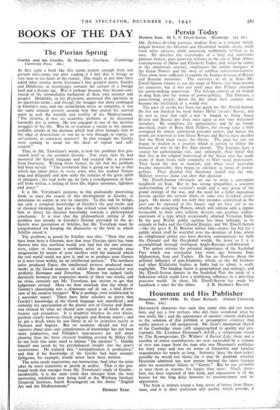BOOKS OF THE DAY
The Pierian Spring
Goethe and the Greeks. By Humphry Trevelyan. (Cambridge
University Press. 18s.) _- AT first sight a book like this seems remote enough from our present obsessions, but after reading it I feel that it brings us very near to the heart of the matter. One might at any time have asked what motive drove Germany's two greatest poets, Goethe and Hiilderlin, so irresistingly towards the culture of a foreign land and a distant age. Was it perhaps because they became con- vinced of the irremediable barbarism of their own country and people? Holderlin, in his Hyperion, answered this question in no uncertain terms ; and though the struggle was more prolonged in Goethe's case, and the assimilation never so complete, it was the same natural poverty around him that caused his starved spirit to seek the warmth and fertility of the Mediterranean. " For Goethe, it was no academic problem to be discussed learnedly pro et contra. He was engaged in one of the decisive struggles of his life. Was he to continue a victim to the uncon- trollable attacks of the daemon which had often brought him to the edge of destruction, or was he to win through to repose, to self-control, to conscious mastery? In that struggle the Greeks were coming to stand for the ideal of repose and self- control."
That, in Mr. Trevelyan's words, is how the problem first pre- sented itself to the youthful Goethe. Ten years later he had mastered the Greek language and had escaped like a prisoner from Germany. Writing from Venice, he felt that the problem had been solved. " The revolution that is going on in me is that which has taken place in every artist who has studied Nature long and diligently and now seeks the remains of the great spirit of antiquity ; his soul wells up, he feels a transfiguration of him- self from within, a feeling of freer life, higher existence, lightness and grace."
It is Mr. Trevelyan's purpose, in this profoundly interesting book, to trace the course of this development in Goethe, to determine its extent, to test its sincerity. To this task he brings, not only a complete knowledge of Goethe's life and works and of classical literature, but also a fine critical sense which enables him to direct his detailed knowledge towards a philosophical conclusion. It is true that the philosophical setting of the problem was already in Goethe's lifetime provided by the in- finitely wise perception of Schiller, but Mr. Trevelyan must be congratulated for keeping the discussion to the level to which Schiller raised it.
The problem, as posed by Schiller, was this : " Now that you have been born a German, now that your Grecian spirit has been thrown into this northern world, you had but the two alterna- tives, either to become a northern artist or to provide your imagination by means of your intellect with the material which the real world could not give it, and so to produce your Greece as it were from within, by an intellectual process." The northern artist produced Faust; the intellectual process produced many works in the Greek manner, of which the most successful was probably Hermann and Dorothea. History has judged fairly decisively between the respective merits of these two works, and no critic, certainly not Mr. Trevelyan, has striven to get that judgement revised. Must we then conclude that the whole of Goethe's classicising was a disastrous cul de sac, a fatal diver- sion of his creative energies? Was it perhaps even misdirected in a narrower sense? There have been scholars to prove that Goethe's knowledge of the Greek language was superficial ; and certainly his appreciation of the plastic arts of Greece and Rome was vitiated by what we should now regard as all kinds of con- fusions and prejudices. It is doubtful whether he ever distin- guished clearly between Greek originals and Roman copies ; and he got a shock when he saw Doric in all its primitive purity at Paestum and Segesta. But we moderns should not feel so superior about that—our completeness of knowledge has not been more productive, and Palladio's inaccuracies are still more pleasing than the latest classical building erected by Hitler (for he too feels this same need to imitate " the ancients "). Goethe himself was saved by his psychological insight into the poet's creativeness. He realised that " incompleteness is productive," and that if his knowledge of the Greeks had been sounder Iphigenie, for example, would never have been written.
The artist needs inspiration, not instruction. And what the artist takes he must transform or perish in aridity. That is the pro- found truth that emerges from Mr. Trevelyan's study of Goethe ; incidentally, it is the same truth that emerges from the very interesting exhibition now being held at the Warburg Institute (Imperial Institute, South Kensington) on the theme " English Art and the Mediterranean."
HERBERT READ.






















 Previous page
Previous page